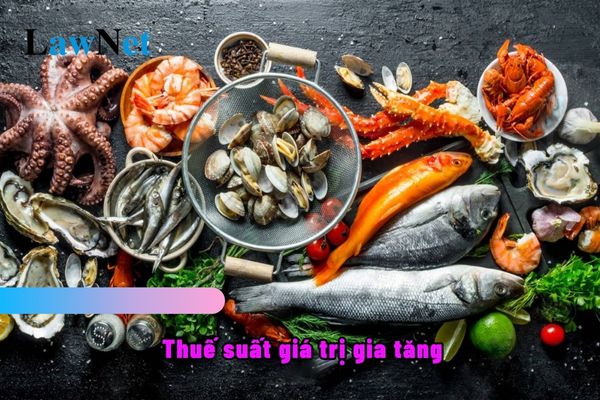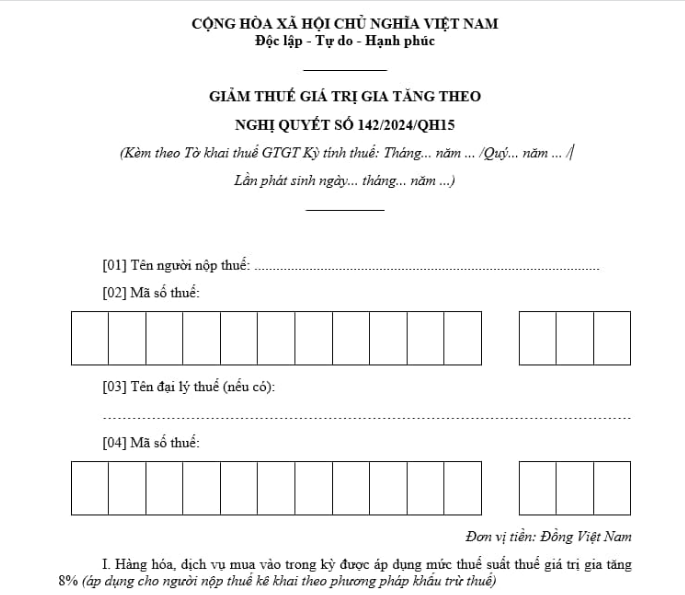Shall value-added tax rate be recorded on the invoice for selling unprocessed seafood for enterprises applying the credit-invoice method in Vietnam?
Shall value-added tax rate be recorded on the invoice for selling unprocessed seafood for enterprises applying the credit-invoice method in Vietnam?
Based on Clause 5, Article 5 of Circular 219/2013/TT-BTC, the regulation is as follows:
Cases not required to declare and pay VAT
...
5. Enterprises and cooperatives paying VAT by the credit-invoice method that sell unprocessed products from agriculture, livestock, aquaculture, and seafood, or only through ordinary preliminary processing to enterprises and cooperatives in the commercial business stage are not required to declare and pay VAT. On the VAT invoice, the sales price should be recorded as a price without VAT, the tax rate line and VAT should not be recorded and should be crossed.
For enterprises and cooperatives paying VAT by the credit-invoice method, selling unprocessed products from agriculture, livestock, and aquaculture or seafood products through ordinary preliminary processing to other entities such as households, business individuals, and other organizations or individuals, VAT must be declared and paid at the tax rate of 5% as guided in Clause 5, Article 10 of this Circular.
Households, business individuals, enterprises, cooperatives, and other economic organizations paying VAT by the direct method on VAT when selling unprocessed products from agriculture, livestock, aquaculture, and aquatic products or only through ordinary preliminary processing in the commercial business stage are required to declare and pay VAT at the rate of 1% on revenue.
Example 19: Company B is a business entity paying VAT by the credit-invoice method; when purchasing rice directly from organizations or individuals, the rice in the purchasing phase from those organizations or individuals is not subject to VAT.
In the case Company B sells rice to Export-Import Company C, Company B is not required to declare and pay VAT for the rice sold to Export-Import Company C.
Company B sells rice to Company D (a noodle production business), whereby Company B is not required to declare and pay VAT for the rice sold to Company D.
On the VAT invoice issued to Export-Import Company C and Company D, Company B must clearly state the sales price as a price without VAT, and the tax rate and VAT lines should not be recorded and crossed.
When Company B sells rice directly to consumers, they must declare and pay VAT at the tax rate of 5% as guided in Clause 5, Article 10 of this Circular.
Example 20: Company A, a business entity paying VAT by the credit-invoice method, purchases coffee beans from coffee-growing farmers. If Company A then sells the coffee beans to Household Business H, the revenue from selling coffee beans is subject to a 5% tax rate.
Example 21: Household Business X, after purchasing tea leaves from tea growers and selling them to Household Business Y, must calculate and pay VAT at the rate of 1% on the revenue from selling tea leaves to Household Business Y.
In cases where unprocessed products from agriculture, livestock, aquaculture, and aquatic products or only through ordinary preliminary processing are sold to enterprises and cooperatives that have already issued invoices, declared, and calculated VAT, both the seller and buyer must adjust the invoices so that they do not have to declare and pay VAT as directed in this Clause.
...
Accordingly, in reference to the above regulations, enterprises applying the credit-invoice method, when selling unprocessed seafood, will not need to record the value-added tax rate on the invoice and should cross it.

Shall value-added tax rate be recorded on the invoice for selling unprocessed seafood for enterprises applying the credit-invoice method in Vietnam? (Image from the Internet)
What are regulations on credit-invoice method for tax applicable to business establishments fully implementing accounting policies in Vietnam?
Pursuant to Article 12 of Circular 219/2013/TT-BTC, regulations on the credit-invoice method for tax applicable to business establishments fully implementing accounting policies are as follows:
- The credit-invoice method applies to business establishments that fully implement accounting policies, invoices, and documents according to the provisions of the law on accounting, invoices, and documents including:
+ Business establishments in operation with annual revenue from the sale of goods or provision of services of one billion dong or more and that fully implement accounting policies, invoices, and documents in accordance with the provisions of the law on accounting, invoices, and documents, except for households and business individuals paying tax under the direct method as guided in Article 13 of Circular 219/2013/TT-BTC;
+ Business establishments registering voluntarily to apply the credit-invoice method, except for households and business individuals paying tax under the direct method as guided in Article 13 of Circular 219/2013/TT-BTC;
+ Foreign organizations or individuals providing goods, services for conducting oil and gas exploration, development, and exploitation activities pay tax by the credit-invoice method declared and deducted by the Vietnamese party.
Which form is the VAT reduction declaration form in Vietnam?
The form for VAT reduction declaration is form number 01 according to the regulation Appendix 4 issued together with Decree 72/2024/ND-CP as follows:

Download the VAT reduction declaration form from July 1, 2024, according to Decree 72/2024/ND-CP.

